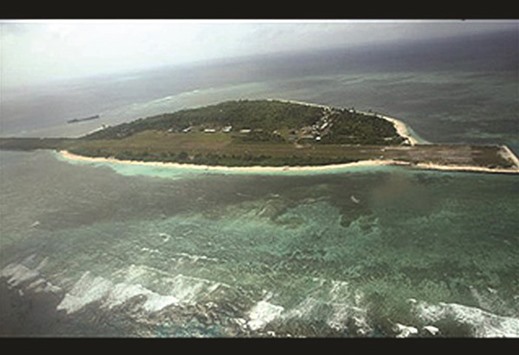The Philippines has urged China to refrain from any activity that would further escalate tension in the hotly contested West Philippine Sea (South China Sea).
Charles Jose, spokesman of the Department of Foreign Affairs (DFA), was reacting to a Hong Kong media report that Beijing may begin reclamation work at Panatag (Scarborough) Shoal after the G20 Summit on September 4 to 5 in Hangzhou, China.
“We continue to call on all parties to refrain from doing anything that would further escalate the tension and we continue to call on all parties to exercise self-restraint and work with the regional effort to promote peace, security and stability in the region,” Jose told reporters.
Panatag, a resource-rich traditional fishing ground, is within the Philippines’ 200-nautical mile exclusive economic zone (EEZ), where the country can exercise sovereign rights under the 1982 United Nations Convention on the Law of the Sea (Unclos). China is a signatory to the treaty.
Relations between Manila and Beijing hit a low point after a July 12 ruling by an international tribunal that invalidated China’s historic claims to most of the South China Sea.
The South China Morning Post has reported that there would be no provocative action from China until after the G20 meeting in eastern China, but construction could begin before the US presidential election in November.
This means China’s buildup may start between September 6 and November 8.
“Since the G20 will be held in Hangzhou next month, and regional peace will be the main topic among leaders of the great powers, China will refrain from [acting on the]reclamation plan,” the report quoted a source as saying.
“US President Barack Obama will focus on domestic issues ahead of the [US] election as he needs to pass down legacies before leaving office.
That might make him busy and he might not have time to take care of regional security issues,” the source added.
The Philippines has the capacity to monitor what’s happening in Panatag, but the DFA still has to verify the Hong Kong report, Jose said.
Striking distance The location of Panatag, 124 nautical miles northwest of Luzon, is strategic as it puts Chinese warships and fighter jets within striking distance of the Philippines’ main island.
China will also have easier and unguarded access to the Pacific Ocean through the Bashi Channel — a waterway between the Philippines and Taiwan — to attack the United States in the event of a war.
President Rodrigo Duterte is set to attend the annual summit of the Association of Southeast Asian Nations (Asean) in Laos on September 6 to 8 where he will meet the leaders of the US and China, but said on Wednesday he won’t raise the dispute.
Duterte told reporters he wanted the matter discussed in a bilateral setting.
“No, I will only bring the issue face-to-face [with China]… because if you quarrel with them now, claim sovereignty, make noise here and there, they might not just even want to talk,” he said.
“Let us create an environment where we can sit down and talk directly, and that is the time I would say, we proceed from here,” Duterte added.
Jose said the DFA was already “happy” with the joint statement of Asean foreign ministers last month that called for the peaceful resolution of disputes in accordance with international law.
The statement did not mention the July 12 ruling of The Hague-based Permanent Court of Arbitration that nullified China’s excessive claims to the South China Sea.
On August 12, former President Fidel Ramos met with contacts in Hong Kong in his capacity as special envoy to China, and said his efforts could lead to formal talks between Manila and Beijing.
On Monday, Foreign Secretary Perfecto Yasay Jr told The Manila Times editorial team in a roundtable discussion that Manila will pursue efforts to rally the international community in urging China to respect international law.
Manila, however, is not keen on further escalating the issue by haling Beijing anew to arbitration to seek monetary compensation, for environmental destruction as a result of Chinese reclamation in the disputed waters.
“If we are a strong country, maybe the equation is different. But you know, this is the reality that we have to face: our defence will be gobbled up by superpowers like China that has a history of being a bully,” he said.

Panatag (Scarborough) Shoal.
